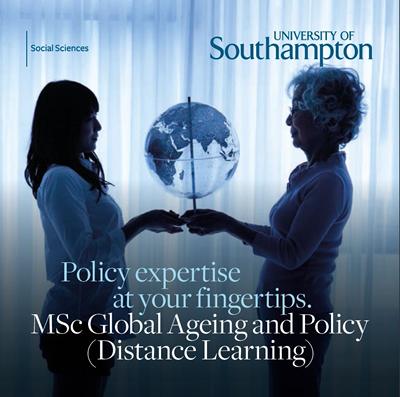The programme aims to provide you with:
- critical appreciation of the key theoretical perspectives within Gerontology and their application in the analysis of specific issues concerning ageing and the lifecourse
- understanding of contemporary debates within Gerontology concerning the lives of older people, their families and society, in both developed and developing countries
- specialised learning of ageing and its policy implications in less developed regions of the world
- competence in qualitative or quantitative research methods and their application to key research questions
- critical skills in the evaluation of policies and programmes in ageing societies
- ability to design and conduct independent research within Gerontology using appropriate research methods
- preparation for a career in the field of Gerontology and applied health and social science.
View the programme specification for this course for 2020/21 entrants
View the programme specification for this course for part time 2020/21 entrants
View the programme specification addendum for this course for 2020/21 entrants
View the programme specification addendum for this course for part-time 2020/21 entrants
View the programme specification for this course for 2021/22 entrants
View the programme specification for this course for part time 2021/22 entrants
Key Facts
What is gerontology?
Gerontology is the study of ageing at the individual and societal levels. It examines the changes humans undergo as they age, as well as the impact of growing proportions of older people on social institutions, labour markets, welfare systems and families. The study of ageing also investigates the relationships between generations and the interconnections between individuals’ experiences over the lifecourse. The postgraduate programme on ageing draws on a range of disciplines including social policy, demography, sociology, biology, health sciences, psychology and economics.
Our residential course
Our MSc Distance Learners get to attend a residential course at our Highfield Campus in Southampton and meet their academic teachers as well as exchange best practice with fellow distance learners.
Dissertation topics
Examples of dissertation topics undertaken by students on this programme in the past:
- The impact of the challenges caused by parenting orphans and vulnerable children to the health and economy of the older people in sub-Saharan Africa.
- Quality of care provided to people living with dementia by health care workers: A case study of a psychiatric hospital.
- A comparison of older persons social pensions schemes in sub-Saharan Africa: Impact and challenges.
- Challenges faced while caring for older person with dementia in residential care in Nairobi, Kenya: A caregivers’ perspective.
Other University of Southampton sites
Typical entry requirements
Selection process
Typical entry requirements
We welcome applications from students holding, or expecting to hold, an upper second-class honours degree or higher, or equivalent.
Students without the usual entry qualifications may be admitted, with the requisite approval, on the basis of relevant work experience or professional qualifications. Mature applicants without formal qualifications but with relevant experience are also welcomed and will be considered.
For all applications, two academic references are required. Unfortunately, we cannot consider applications until we have received both references.
English language requirements
If your first language or language of education is not English, we will ask you to show evidence of fluency in the use of English. For all of our postgraduate programmes we require a level of IELTS 6.5. For details of other English language tests which we accept, please visit the International students section of our website.
If you require further English language tuition before commencing your programme with us, you may apply for one of our pre-sessional English language courses which are run by the Centre for Language Study.
Visit our International Office website or the NARIC website for further information on qualifications.
This page contains specific entry requirements for this course. Find out about
equivalent
entry requirements and qualifications for your country.
Typical course content
Full-time students take three modules per semester, six in total by the end of the second semester. The dissertation is submitted by the end of September of that year.
Students on the part-time programme take two compulsory modules and one option module in each year of the studies. The dissertation is conducted in the second year and normally submitted by the end of December in year two. Please contact us for further details.
Please note: This specification provides a concise summary of the main features of the
programme and the learning outcomes that a typical
student might reasonably be expected to achieve and demonstrate if s/he takes full advantage
of the learning opportunities that are provided.
More detailed information can be found in the programme handbook (or other appropriate guide
or website).
Tuition fees
List of tuition fees for this course and it's variations| Course Title | Award | Year of entry | Mode of study | UK/EU | International |
|---|
| Global Ageing and Policy (Distance Learning) | MSc | 2020 | Full-time | £9,250 | £18,812 |
| Global Ageing and Policy (Distance Learning) | MSc | 2020 | Part-time | £4,625 | £9,406 |
| Global Ageing and Policy Flexible (Distance Learning) | MSc | 2020 | Part-time | £3,100 | £6,276 |
| Global Ageing and Policy Flexible (Distance Learning) | PGDip | 2020 | Part-time | £2,100 | £4,187 |
Funding
Scholarships, bursaries, sponsorships or grants may be available to support you
through your course.
Funding opportunities available to you are linked to your subject area and/or
your country of origin.
These can be from the University of Southampton or other sources.
Costs associated with this course
Students are responsible for meeting the cost of essential textbooks, and of producing such
essays, assignments, laboratory reports and dissertations as are required to fulfil the
academic requirements for each programme of study.
There will also be further costs for the following, not purchasable from the
University:
| Type | Description |
|---|
| Stationery | You will be expected to provide your own day-to-day stationery items (e.g. pens, pencils, notebooks, etc.). Any specialist stationery items will be specified under the Additional Costs tab of the relevant module profile. |
| Books | Where a module specifies core texts these should generally be available electronically on the reserve list in the library. However due to demand, students may prefer to buy their own copies. These can be purchased from any source. Please note that the vast majority of readings in Gerontology are available electronically through e-journals, as digitised text in the Online Course Collection or as e-books. Students on the GERO6014 or GERO6015 modules receive one textbook per module as part of their tuition fees via post.
Some modules suggest reading texts as optional background reading. The library may hold copies of such texts, or alternatively you may wish to purchase your own copies. Although not essential reading, you may benefit from the additional reading materials for the module. |
| Equipment | Software Licenses- Licenses relating to software used in the programme (eg. SPSS, NVivo) are purchased by the University, and students can download them from the iSolutions website using their username and password. |
| Equipment | Hardware- Participating in the Distance Learning programme requires the student to access to a PC/ laptop. Students may also wish to purchase their own PC/laptop or tablet in order to access Blackboard. |
| Printing and copying | For all GERO modules, coursework (such as essays; projects; dissertations) is submitted on line. Information on the MSc Student Handbook, Module Outlines and other key learning materials (eg. Module Outlines) is available electronically via Blackboard. |
| Conference expenses | Where students wish to attend a scientific conference during their studies, they are liable for any accommodation cost associated (as well as any conference registration fees). |
| Travel | Where students wish to attend a scientific conference during their studies, they are liable for any travel cost associated. |
| Other | Students on the MSc Global Ageing and Policy (DL) programme are invited to attend a Dissertation Workshop which takes place in Southampton or virtually. |
In some cases you'll be able to choose modules (which may have different costs associated
with that module) which will change the overall cost of a programme to you. Please also
ensure you read the section on additional costs in the University’s Fees, Charges and
Expenses Regulations in the University Calendar available at www.calendar.soton.ac.uk.

